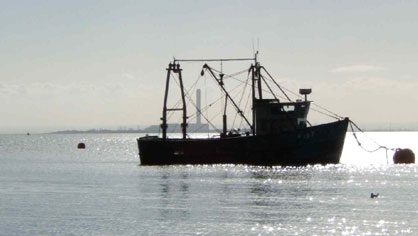26 April 2013
The NFFO has brokered an agreement between a number of producer organisations and under-10m fishermen in the South East and Thames Estuary, with the aim of breaking the deadlock in solving the quota problems facing the under-10m fleet in the region.
Under-10m fishermen from Harwich, West Mersea, Ramsgate, Folkestone, Dungeness, Rye and Selsey met in London with representatives from nine producer organisations.
Barrie Deas, Chief Executive of the National Federation of Fishermen’s Organisations, said:
“The meeting was a response to the failure to make headway on the under-10m quota question and to move beyond the name- calling and confrontational climate that has dogged the issue and in my view hampered a solution.”
“It was an opportunity for the industry to demonstrate that it has the capacity to work together and to generate solutions that have apparently been beyond Government. The discussion was focused on getting out of the quagmire through cooperation, collaboration and using the right tools for the job.”
The agreement that has emerged from the meeting has a number of important elements:
- A focus on the real quota pinch-points in both the North Sea and Eastern Channel: skates and rays, sole, cod, and at some times of year lemon sole and plaice. There is a recognition that the problem with Channel cod lies beyond domestic quota management rules and so any solution likewise lies elsewhere
- A recognition that all under-10s are not all alike: The higher catching under-10s need access to significant amounts of quota, whereas there are many vessels targeting non-quota species that work well most of the time within the existing pool system
- The success of the Ramsgate/Dungeness quota pilot in providing the participants with more flexibility, ability to plan the fishing year and additional quota through swaps and transfers, illustrate the benefits of this type of group arrangement, even if the basic track record quotas do not look that promising
- The producer organisations made the point that with professional quota management advice and support the pilot vessels could have been in an even stronger position and offered their assistance to under-10m groups affiliating with POs
- An offer by the POs to provide affiliate status to under-10 groups which approach them for support. This support would take the form of assistance with quota swaps and transfers and other aspects of professional quota management that PO members currently benefit from
- The identification of available quota within the system that could be accessed for the benefit of the affiliated under-10s
- The issue of latent capacity is a real one: Substantial increases in monthly pool allocations would inevitably draw in fishing capacity that is currently dormant or at a very low level, with no overall benefit for the existing vessels operating in the pool
- It was agreed that the NFFO should put its weight behind representations to Defra/MMO for the continuation of the Ramsgate pilot which is due to end shortly.
Barrie Deas added: “Our perception, from an early stage was that the problems facing the under-10m pool were largely because the pool arrangement was not designed to accommodate the high-catching under-10s. Drawing this category of vessel into a collaborative arrangement with the POs, and working on a group basis, should certainly benefit those vessels but it should also leave the pool in a more stable position.
“Hopefully, the meeting has laid foundations for an improvement in the quota situation for the under-10s in the South East, where it is acknowledged that the problem is at its most acute. This was a very positive, constructive and above all forward looking meeting. There are now options where there were very few before, as well as a model of how to improve your lot as an under-10 if you are highly dependent quotas species: Get into a quota group; work closely with a PO of your choice; work with the quota managers in the POs to maximise the quota available to your group.”
“It was clear from the meeting that the producer organisations have a considerable interest in ending the turbulence in the under-10m sector and there was concrete evidence at the meeting of their willingness to assist the under-10s.”

